
|   |

|   |
 e-mail: ukb7@rediffmail.com Dissecting society's underbelly Photos courtesy: Rangroop January 4, 2020 A time was when the joint family system in Indian society took care of the elders of the family, there being always some siblings who would take care of the aged parents. After the nuclear family emerged in the society's industrial and post-industrial phases, the children, after receiving childhood education, necessarily drifted apart from their parents to settle in the new places of employment, leaving the elders severely alone. In metropolises like Kolkata, there are innumerable cases where the children either earn their livelihood at faraway places like Bangalore or have moved abroad, giving rise to a severe social problem: that of urban loneliness. One solution to this malady has been a chain of usually ill-kept "old age homes" where the deserted parents would move to live in a brand new habitat, enlivened by generally rare social visits by the now estranged siblings at their own convenience. In cases where parents - normally with strong willpower - stuck to continue in their own homes, the siblings would not hesitate to milk them if they have any marginal utility left still. Alternatively, the new-age "promoters" would hover round them almost like vultures and attempt uprooting them, to grab the property for raising multi-storied structures. The ace director Sima Mukhopadhyay has looked at some of these vulnerable situations with great empathy and gifted the Kolkata viewers two 'clinical' studies done with an unerring scalpel. Mayer Moto (Like the Mother) 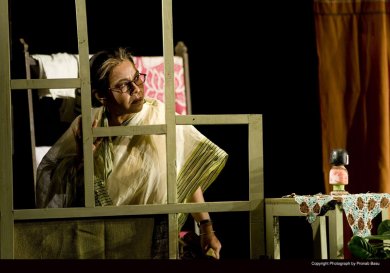
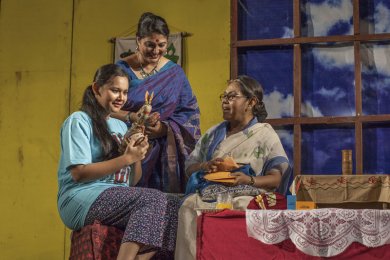
Presented by 'Rangroop', this play - based on a story by the noted author Kabita Singha and dramatized by the well-known playwright Mohit Chattopadhyay - is built around a seasoned freedom-fighter (now deceased) and his brave wife who raised two sons and a daughter with great fortitude. The eldest son, sent to study abroad with a lot of financial sacrifice, chooses to stay abroad for a quarter century and returns to settle in a posh locality only when it becomes imperative to let his daughter get married. While the sister is married off in the reflected glory of the elder brother, the youngest son - the "ugly duckling" of the family - is a failure in life who tries to sponge on others' largess. The scene opens when the eldest sibling fixes on an excellent match for the girl and needs his mother to impress the matriarch of the groom's family with his widowed mother's contacts. Only then "connects" start building up: the elder son deigns to "visit" the mother, if only to persuade her to come to his palatial home and meet the matriarch; the long-lost sister turning up at mother's place, only to play the catalyst to the elder's match-making; and the youngest materializing on the scene, only to coax the mother for asking favors - like a cushy job -from the elder brother in his favour. How the mother complies with each selfish request from the erring siblings' selfish requests, but refuses to yield on her own dignity in not becoming their "doting mother" any more, but only fulfilling her duty "like a mother"—is the rest of the gripping story. It is awesome how Sima carries the burden of acting as the pillar of the fragmented family, still with every bit of her self-dignity intact. The play unfolds the complex relationships and the changing equations with their mother with an unerring penchant of directorial skill of Sima. The elder brother, the "arch villain" of the piece, is well enacted by Jayanta Mitra. The groom's matriarch, a freedom fighter herself, enters like a breath of fresh air and lends an interesting twist in the episode. On the whole, Mayer Moto is a tour de force on the Kolkata stage. Gorol (The Poison) 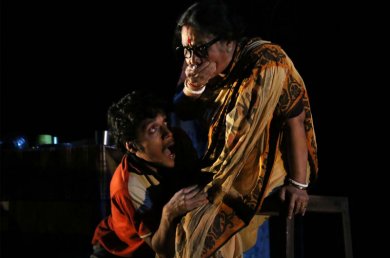
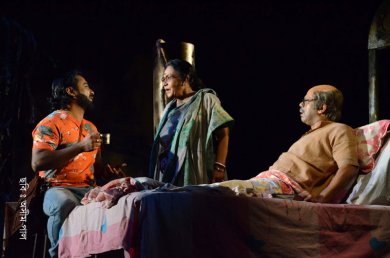
Also presented by 'Rangroop' based on a story of Sayantani Patatunda and dramatized by Mainak Sengupta, this play revolves round an elderly couple (played with great aplomb by Sima Mukhopadhyay and Jayanta Mitra) living the life of a reclusive couple, as much fighting the tears, smiles and emotions of the past, now vivid in recapitulation, as fighting literally the invading rats in a ramshackle home (where they have to perpetually store rat poison). Their "Man Friday" is a limping aged man who had been a fearsome dacoit in his own time. The head of the house, who had been a senior police officer once, is now a bed-ridden cripple. Their biggest worry are the perpetually invasive "promoters" who would be deliriously happy to see them get out of the crumbling house and have there a multi-storied home built instead. The grown-up son, an only child of the family, has found his vocation in the outside boisterous life and one night he comes home, confessing that he, and his friend, have both raped and murdered a hapless girl walking alone and the police is now in his hot pursuit. The helpful mother bundles him out of the rear window, the police is hoodwinked and all is well, at least temporarily so. Sometime later, the promoters catch up with the old couple in the garb of their absconding son's friend and pretend to bring glad tidings of their son's settled job in Dubai. How the ailing father is almost convinced, but the ever vigilant mother metaphorically "smells a rat" and how she, with the connivance of the servant, and aided by strong rat poison, sees the last of the "visiting friend" - preoccupied with make-believe bonhomie, rounded off with an impromptu dinner -- is the rest of the thriller. Again the "whodunit" story works remarkably well and the directorial skill is evident in every movement of the play. The sets are wonderfully suggestive of a mysterious milieu, the teamwork is excellent and, above all, 'the end' -- namely, matching evil with evil -- remains dramatically in focus, howsoever dubious 'the means' may seem. 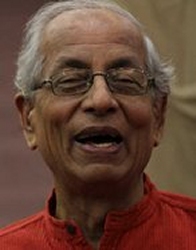 Dr. Utpal K Banerjee is a scholar-commentator on performing arts over last four decades. He has authored 23 books on Indian art and culture, and 10 on Tagore studies. He served IGNCA as National Project Director, was a Tagore Research Scholar and is recipient of Padma Shri. Post your comments Please provide your name and email id when you use the Anonymous profile in the blog to post a comment. All appropriate comments posted with name and email id in the blog will also be featured in the site. |